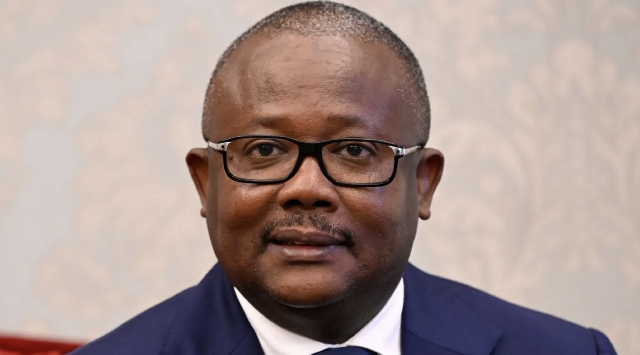Guinea-Bissau president flees to Senegal after coup
 Umaro Sissoco Embaló, Guinea Bissau president
Umaro Sissoco Embaló, Guinea Bissau president
Guinea-Bissau's deposed President Umaro Sissoco Embaló has arrived in neighbouring Senegal following his release by military forces that toppled his government this week, Senegal's authorities have announced.
It follows negotiations by the regional West African bloc Ecowas to secure his transfer amid rising tensions in Guinea-Bissau.
Senegal's foreign ministry said in a statement that Embaló had landed in the country "safe and sound" on a chartered military flight late on Thursday.
The military in Guinea-Bissau has already sworn in a new transitional leader, Gen Horta N'Tam, who will rule the coup-prone country for a year.
Wednesday's coup came a day before authorities were due to announce the provisional results of a presidential and parliamentary election.
The military has suspended the electoral process and blocked the release of the results.
It said it was acting to thwart a plot by unnamed politicians who had "the support of a well-known drug baron" to destabilise the country, and imposed a night-time curfew.
Sandwiched between Senegal and Guinea, the coup-prone country is known as a drug-trafficking hub where the military has been influential since it gained independence from Portugal in 1974.
Both Embaló and his closest rival Fernando Dias had claimed victory in Sunday's presidential poll.
Dias was supported by former Prime Minister Domingos Pereira, who had been disqualified from running.
Government sources earlier told the BBC that Dias, Pereira and Interior Minister Botché Candé had also been detained.
The military junta has banned public protests and "all disturbing actions of peace and stability in the country".
Tension remained high in the capital, Bissau, on Thursday, with most shops and markets closed as soldiers patrolled the streets, news agency AFP reported.
Earlier that day, Gen N'Tam, the Guinea-Bissau army's chief of staff, was named the country's new leader for a period of one year.
Gen N'Tam said in a speech that the military had acted "to block operations that aimed to threaten our democracy".
Shortly after the swearing-in, the military reopened land, air and sea borders that were shut when it announced the coup.
Some civil society groups in Guinea-Bissau have accused Embaló of masterminding a "simulated coup" against himself with the help of the military, saying it was a ruse to block election results from coming out in case he lost.
Dias, who was Embaló's main challenger, made similar claims, saying it was an "organised coup".
He told the AFP that he considered himself the president-elect of Guinea-Bissau and believed he won roughly 52% of the vote.
Embaló has not responded to the allegations.
The 53-year leader said he has survived multiple coup attempts during his time in office. However, his critics have previously accused him of fabricating crises in order to crack down on dissent.
Ecowas leaders have suspended Guinea-Bissau from all decision-making organs until constitutional order is restored. In a statement, the bloc ordered the military to return to the barracks, calling its actions a "grave violation of Guinea-Bissau's constitutional order".
The African Union (AU) has also condemned the coup and called for respect for the constitutional order.
UN Secretary-General Antonio Guterres said in a statement that he was "deeply concerned" about the situation in Guinea Bissau, calling for an "immediate and unconditional restoration of constitutional order".
Guinea-Bissau has witnessed at least nine coups or attempted coups over the last five decades.
Source: bbc.com
Trending World

24 Nigerian schoolgirls released over a week after abduction
16:56
Catholic bishop hits out at Nigeria's failure to rescue abducted schoolchildren
01:42
Bolsonaro ordered to start serving 27-year prison sentence for Brazil coup plot
01:40
Palestinian-US teen freed after 9 months in Israeli jail
00:12
France to bring in form of military service, 25 years after conscription was phased out
18:46
General named new Guinea-Bissau leader a day after coup
18:43
Pope Leo arrives in Turkey on first foreign trip of papacy
13:13
Georgia judge dismisses 2020 election interference case against Trump
11:47
At least 44 dead and hundreds missing after fire engulfs Hong Kong tower blocks
11:31
Guinea-Bissau president flees to Senegal after coup
10:42




